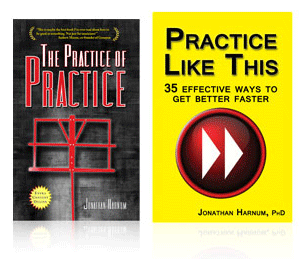Most professional musicians I’ve spoken with about practice believe that the performance is one of many forms of practice. Some use performance specifically as their only practice. For those who practice alone or are shy, a good performance requires skills that aren’t honed in the practice room. You’ve got to just get out there, do it, and learn from it. This fun TED talk by Joe Kowan is a perfect example of practicing performance, and using creativity to enhance practice.
Want to learn more about the best ways to practice? Get an e-mail with a discount code when The Practice of Practice is published (June, 2014). To learn more about the book, check out a sample from The Practice of Practice.
Practicing performance is a chapter in my next book. If you want more details about practicing performance, using creativity in practice, and many other useful practice strategies pros use and research has tested, my next book, The Practice of Practice, will be done in March and out in April. It’s right around 250 pages right now, and it’s a good read, if I do say so myself. You can shoot me an e-mail to get a note when The Practice of Practice is available. click here





One time, while we were waiting for our spot on a festival stage, I said to my wife, a long-time stage performer, “Why don’t you get stage fright?” and she said, matter of factly, “If you do this enough, you get used to it.” and *I* said, “I’ve been doing this for nearly 30 years, *when* do I start getting used to it?”
so I tried all sorts of things, deep breathing, avoiding caffeine, alcohol (a particularly bad strategy), yoga stretching, visualization reframing, absolutely nothing worked, I’d still rather see a dentist than get on that stage again, and off I’d go, locked up, mind blank, fingers cold and half-speed, I’d keep it simple, I’d say, play way under your limit, I’d say, it was awful. I kept at it. Off-stage I was certain people avoided talking about my performance, they were embarrased *for* me, that was the content I projected out, so that’s what they received.
And then, curiously as per that paid link on your page here from Health.com, I have to concur with them! the way I overcame my stage fright was to simply accept that, physiologically, the sensation of ‘stage anxiety’ and ‘excited anticipation’ are identical; there is no physical difference! They are the same brain/body state, and so there is no possible way that I could logicaly tell whether I was in actual fact suffering stage fright and not just really excited about taking the stage to tell my story! That was my epiphany.
And now people say to me, “You have such *energy* on stage!” 🙂
Great response, Mr. G. I concur completely. Thanks for sharing.
I also still have “stage-fright,” after around 30 years of playing, but have come to see it similarly. It’s a nervous energy that comes (for me) partly from being an introvert, and partly from wanting to give a good performance.
The last thing an introvert wants is for anybody to be watching/listening with rapt attention. My favorite gigs are those in which nobody’s really paying attention, or if they do, it’s because whatever we’re playing GOT their attention. The nervous energy helps me to focus. It’s a reminder that I want to play well. I think if I began to become numb to the feeling, the performance would suffer.
Unsubstantiated anecdote: someone told me Peter Cetera (from the band Chicago) suffered from terrible stage fright, and it was one of the factors that led to him stepping down as lead singer of the band.